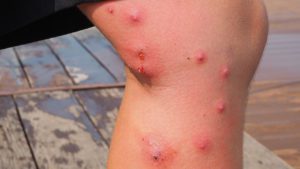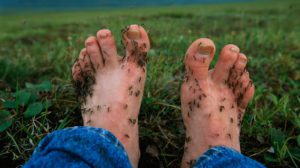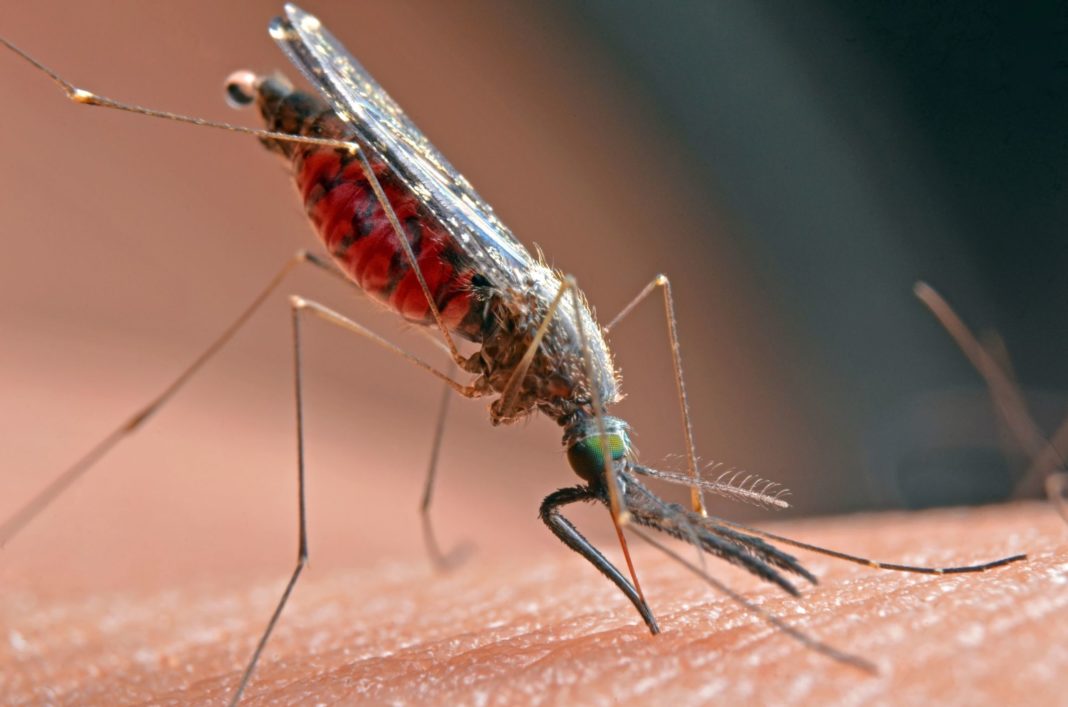Why Should We Not Pop a Mosquito Bite?
It is important to understand a mosquito bite to treat one effectively and promptly. Mosquitoes pierce the skin using their mouthpiece also referred to as proboscis. During the feeding process, when drawing blood, they also release a bit of saliva containing anticoagulants and proteins into your blood. To react to these foreign substances, the immune system releases histamine that sends the white blood cells to the affected area, as an immunity response. This compound called histamine is what causes inflammation and itching.
Our Curated List For :
Effective Treatments for Mosquito Bites

Treating mosquito bites can help soothe the skin and reduce itching. Below are some useful treatments you can consider:
- Baking soda – Baking Soda is the most commonly available ingredient in most kitchens. Form a paste with water and apply it to the bites. Leave it on for about 10 minutes and wash it. This provides relief from the itching.
- Washing – Washing the area infected with soap and water sanitizes and cleanses the skin, providing relief.
- Cold compress – Apply an ice pack or a bag of frozen veggies. This helps soothe the bites.
- Anti-itch creams – You can use an over-the-counter anti-itch or antihistamine cream to relieve the itching and reduce the redness. Be sure you read the instructions carefully before applying. A patch test is advisable before use.
- Controlling the breeding and spread – Always ensure that there is no stagnant water around your home. You can also use netting to cover your windows and beds at night.
- Repellents – Repellents are effective in keeping mosquitoes at bay in most cases. They are available in liquid form, creams, sprays, etc
- Clothing – Wear long-sleeve shirts and long pants when you step out for an evening outing. Wearing loose clothing helps as it becomes difficult for mosquitoes to penetrate through your clothing easily. Additionally, since mosquitoes are easily attracted to the scent of human sweat, spraying clothes with repellents such as DEET or picaridin can help mask the smell of sweat.
- Pest control – If the mosquito infestation has gone out of hand, leaving your family open to deadly attacks and disease, you will need to consult a professional to exterminate them and their larvae from your home and immediate surroundings.
The Risk of Popping Mosquito Bites
When a mosquito bites you, it injects a small amount of saliva into your skin. This saliva acts as a thinning agent, allowing the mosquito to easily draw blood from your vessels. In some people, this saliva can cause an allergic reaction that leads to the development of a mosquito bite bump or welt. While these bumps are usually harmless and go away on their own within a few days, there is a risk of infection if you scratch or pick at the bite.
The risk of infection from scratching or popping a mosquito bite is low, but it can still happen. When you scratch or pop a bite, you can break the skin and introduce bacteria from your fingers into the wound. This can cause an infection, which may be accompanied by redness, swelling, and pain. In rare cases, an infection can lead to more serious complications such as cellulitis, a potentially serious skin infection that can spread to the bloodstream.
Preventive Measures for Mosquito Bites
Mosquitoes can be a nuisance and can also transmit serious diseases such as malaria, dengue fever, and Zika virus. To prevent mosquito bites, here are some preventive measures you can take:
- Use insect repellent: Apply insect repellent to your skin or clothing to repel mosquitoes. Look for products that contain DEET, picaridin, or oil of lemon eucalyptus.
- Wear protective clothing: Cover up with long-sleeved shirts, pants, and socks to reduce exposed skin. Wear light-colored clothing, as mosquitoes are attracted to dark colors.
- Use mosquito nets: Use mosquito nets over your bed, especially if you are traveling to an area with a high risk of mosquito-borne diseases.
- Remove standing water: Mosquitoes breed in standing water, so eliminate any sources of stagnant water around your home, such as bird baths, flowerpots, or gutters.
- Stay indoors at dawn and dusk: Mosquitoes are most active during these times, so try to stay indoors if possible.
- Install screens: Install screens on doors and windows to prevent mosquitoes from entering your home.
- Treat your clothing: Treat your clothing with insecticide to repel mosquitoes. Permethrin is a common insecticide used for this purpose.
By taking these preventive measures, you can reduce your risk of mosquito bites and protect yourself from mosquito-borne diseases.
Closing Thoughts

Knowing about mosquitoes, their bites, treatments, and prevention measures go a long way in keeping your family safe from mosquito bites and possible diseases resulting from them. As discussed, most of the time the bites are harmless and go away on their own. All you need to do is avoid popping or scratching them. If you feel that the symptoms following mosquito bites in you or your family have gotten worse, such as bad headaches, high fever, and vomiting, please arrange a visit to the emergency room immediately. One can only be too careful.
Also read:-
FAQs on Popping Mosquito Bites
Q: Is it safe to pop mosquito bites?
A: No, it is not safe to pop mosquito bites. Popping or scratching the bite can break the skin and increase the risk of infection.
Q: Why should I not pop mosquito bites?
A: Popping mosquito bites can introduce bacteria from your hands into the bite area, increasing the risk of infection. It can also irritate the bite and prolong the healing process.
Q: What should I do if I accidentally pop a mosquito bite?
A: If you accidentally pop a mosquito bite, clean the area with soap and water to reduce the risk of infection. Apply an antiseptic cream and cover the area with a bandage if necessary.
Q: How can I relieve the itching from mosquito bites without popping them?
A: There are several ways to relieve the itching from mosquito bites without popping them. Applying a cold compress, using over-the-counter anti-itch creams, such as hydrocortisone, or taking an oral antihistamine can help relieve the itching.

